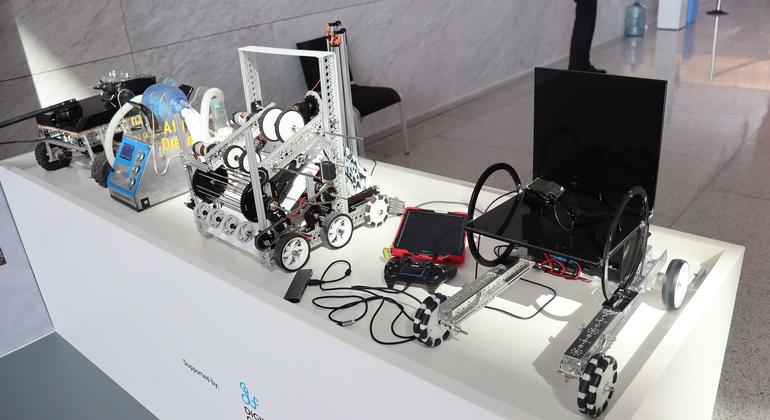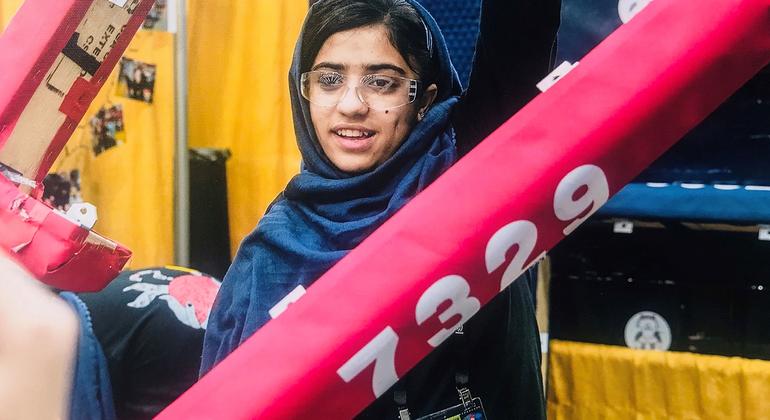In 2021, UNOSSC and ICGEB jointly launched EMPOWER Fellowship at a strategic and critical time when the global community was fighting against an unprecedent health crisis, COVID-19, and in search of vaccines, treatments, and other innovative technologies.
UN News/Pengfei Mi
Dima Al-Khatib, the Director of the UNOSSC, highlighted the critical role that young women scientists can play in driving innovation and development in these regions and called for greater support and investment in their education, training, and capacity development. When asked about the underrepresentation of women in science, Rejwana emphasized the importance of women’s participation in this field, saying that half of the world’s population is women, but they are left behind in the scientific sphere due to various social and societal issues and impediments. According to Lawrence Banks, Director-General of ICGEB, five young women scientists from Bangladesh, Colombia, DR Congo, Tanzania, and Zimbabwe were selected, as the pilot cohort. “That is why the DPoA has a concrete target in this area, to undertake feasibility studies for establishing an online university,” explained Fatima. “The university’s goal is to achieve a 50/50 gender balance at all levels, while also guaranteeing special access for the poorest people and in vulnerable situations.” The theme of this year’s International Women’s Day, ‘Innovation and Technological Change: Education in the Digital Age’, is directly relevant to the focus of the LDC5 Conference. These topics feature prominently in DPoA and have been the subject of discussion by all stakeholders in Doha for the past five days. “Today we are here to show the power, ability and talent of girls in Afghanistan. We never gave up,” Asefa Amini, Somaya’s team member, told UN News, and added: “I hope that one day all the girls of Afghanistan will have the opportunity to show what they can do.”
A journey to science
The team members have been studying in Qatar since August 2021, after being evacuated from their home country “without saying goodbye to their families”. After the Taliban returned to power, new rules have banned girls from education and denied women their human rights. The jubilant ceremony also featured a traditional African dance performance by Muda Africa from Tanzania, the winner of the UNESCO International Fund for Cultural Diversity, which helps creatives seize the opportunities offered by the digital environment. “Women and girls bring a unique perspective to the fields of STI, and investing in them can help foster innovation and creativity. By harnessing their skills and perspectives, LDCs can develop more creative solutions to their development challenges,” she said. UN News/Pengfei Mi “The program is a life changing experience for me,” Najneen Rejwana told UN News. She is one of the EMPOWER fellows from Bangladesh and currently works in the Translational Bioinformatics lab in ICGEB. UN Photo/Ruwan Dilanka At noon on Wednesday, LDC5 held a moment of celebration near Maman, the iconic bronze and stainless-steel sculpture by the artist Louise Bourgeois that towers over the main atrium at the Qatar National Convention Centre in Qatar, where the Conference has been under way since last Sunday. A celebration of motherhood, the giant statue, Ms. Bourgeois has said, echoes the strength of her own mother, with metaphors of spinning, weaving, nurture and protection.
In an inspiring documentary launched at LDC5, five women scientists shared their experience as EMPOWER Fellows and how the programme has impacted their research and their life.
Never give up!
© Courtesy of Somaya Faruqi She added: “I believe that education is the key to unlocking the potential of every child. We should give them the key and give them the opportunity to unlock their full potential.” She encouraged women to “come forward and engage themselves in the research field”.
“Let us continue to work towards a world where all women and girls have equal access to every opportunity.”
“I found more opportunities to explore and to do some training that helps me in a better way than before.” said the young woman scientist. Quality and inclusive education, with a focus on basic digital literacy and technical skills in science, technology, engineering, and mathematics (STEM) and information and communication technology (ICT), will contribute to promoting gender equality and empowering all women and girls in LDCs, including those in rural areas. However, she reminded the participants that transformation of our societies for a better, more prosperous and peaceful world “can’t happen without first empowering women and girls”. “Investing in women and girls in STI can lead to economic growth, as it helps create more skilled workers who can contribute to the economy. This can help LDCs build a more diverse and resilient economy that can withstand global economic shocks,” Ms, Al-Khatib told UN News.
Source


